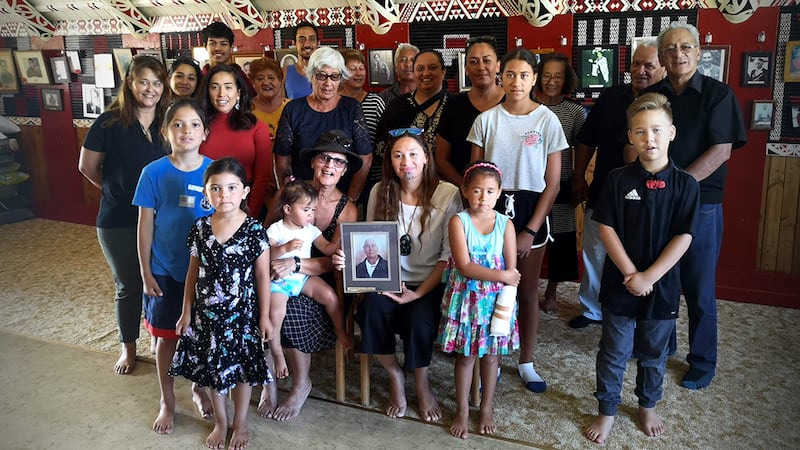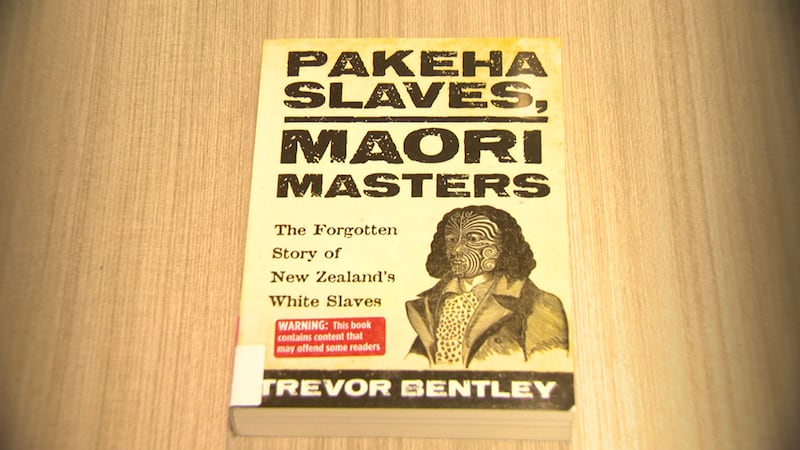Maisey Rika holding a portrait of her ancestor Kuini Hera Caroline Ngoungou. Source - File
Renowned Māori musician Maisey Rika says that her whānau had no idea that their kuia would end up being associated with slavery and sex-trafficking.
Dr Trevor Bentley's latest book 'Pakeha Slaves, Maori Masters' says that Rika's kuia, Kuini Caroline Perrett was a "mōkai" (slave), something that her descendants utterly reject.
“Slave? No, she knew hardship and hard work alright but she also knew love absolute!
Tōku Tīpuna Hera Ngoungou (aka Queenie Caroline Perrett) still capturing headlines even to this day, I think before this...
Posted by Maisey Rika on Sunday, January 12, 2020
“She wasn’t a slave!" Rika says.
In his statement to Te Ao, Dr Bentley admits, that there is no evidence whatsoever, that Caroline Perrett ever “stated” that she was a Pākehā slave with a Māori master.
The author clarifies that he drew his conclusions after comparing Perrett’s memoirs with the established research of several Māori academics. Dr Bentley went into detail regarding Perrett’s capture.
Caroline was captured at eight years old to attain utu (redress or balance). Her Pākehā father of 17, had violated a Taranaki urupā (burial ground). In order to feed his large family, he dug up an urupā to survey it for the coming railroads. As punishment for his sacrilege, his child Queenie was taken and raised as a Māori.
"Her slave or taurekareka status is evident if we look at her account of her early life," Dr Bentley says.
Kuini Caroline Perrett, known as Hera Ngoungou to her Ngāti Awa descendants are not happy. They did not find out that their tīpuna was part of Dr Bentley’s book on slavery until the NZ Herald posted their nanny’s image online.

Some of Hera Ngoungou's descendants of Pūkeko Marae, Whakatāne / Source - File
Rika grew up hearing stories of her tīpuna Hera. She says Hera Perrett was much loved and respected amongst her new whānau, hapū and iwi.
“She was graceful, humble, and a hardworking beautiful kuia,” Rika says.
Hera Perrett was known for her love of card playing and was “ahi kaa” (part of the whānau) to her marae. Such was her connection to her new Māori whānau, that when she was found by her Pākehā family over fifty years later, Perrett chose to stay with her Māori whānau and hapū. Rika explains that her tīpuna politely declined saying, “Their ways are not my ways.”
These words are engraved on Perretts’ headstone.
Perrett stayed to raise the children that she had with her second husband Hikitene Ngoungou from Whakatāne rohe. She remarried after her first husband from Manaia Hauraki, died from consumption after having their first child.
Kuini Hera Caroline Ngoungou’s picture hangs proudly in the wharepuni (meeting house) at Pūkeko Marae, in a place that is reserved for revered ancestors.
Rika concludes by expressing her doubt at the accuracy of the book, "Are those stories really true? Does the evidence back the claims?"
Dr Bentley quoted a list of Māori academics whose research, he believes, back up his claims. He says that his book is based on the research of, “Margaret Mutu, Te Rangi Hīroa, Danny Keenan, Buddy Mikaere, Hirini Moko Mead, [and] Hana O'Regan.”

The source of the controversy / Source - File
Te Ao contacted Dr Sir Hirini Moko Mead for his thoughts, regarding the author’s research methods. Dr Mead warned that Dr Bentley should have contacted the whānau.
“It’s generally known by book writers that they really do need to talk to the descendants of the people that they are writing about or those who have some oral knowledge.”
Dr Bentley concluded his statement to Te Ao by encouraging the whānau to read the book, which has sold out. However, all NZ Libraries have at least two copies available for reference.
The Legacy of Kuini Caroline Perrett Ngoungou
BAFTA winner and Academy Award nominee actress Samantha Morton played the role of Kuini in the 2005 film River Queen. Perrett's character was inspired by the life of Maisey Rika's tīpuna.
Perrett was also featured in an episode of Pioneer Women, a 1983 series about colonial pioneers. It featured the story of Perrett's capture and her refusal to return once her Pākehā family found her.
